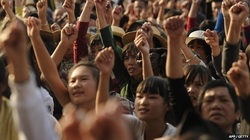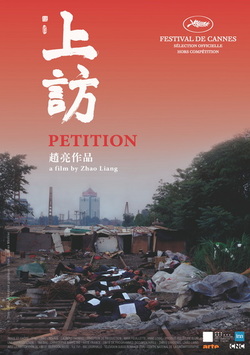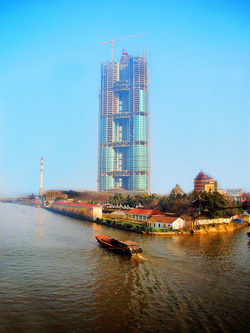
Whilst it’s hardly news to say ‘Keep your eyes on China’, I have a feeling that in the next few years, the meteoric rise of the Dragon may stutter, or indeed change direction. I must confess to having little insider knowledge – I’ve only spent a couple of weeks in China, and all of that was within Xinjiang. However, as with the financial crisis, my belief that something will change comes from looking at everything in the public domain and deciding something doesn't make sense.
If you asked the man in the street about China, then you might expect to hear something about its inexorable rise. Yet there’s something very rotten in this state that comes to the surface with only a little digging. We have grown immured to the constant strikes and protests, but it still comes as a shock to hear that an estimated 90,000 happen every year. The current spate of immolations in Tibet will probably be controlled like the riots in Xinjiang before them, but the anger of the Han Chinese majority may be harder for officials to contain.

At this stage I’d like to recommend the documentary Petition. It follows the terrible travails of some Chinese attempting to get justice through official channels. It’s fairly harrowing but an astonishing exposé of what people will go through: a whole town has grown up for people who have to stay for years to try and get their petition heard and acted upon. Their anger, hope and despair is tough to watch.
Yet even tougher, and perhaps more telling, is the film Last Train Home. This doc isn't even about people who are meant to have problems, just another run of the mill family of migrant workers. Their deep unhappiness and gradual collapse is heartbreaking to witness.

I also found this article on serial killers terrifying. There is an epidemic of serial killers in China, with many being discovered each year, some after killing 77 or 65 (the highest an American has ever been convicted of is 48). The breakdown of morality, the transient nature of migrant worker life, and a culture in which the authorities regard information as something to be given out only sparingly all helps them to flourish.
So what can be done to change things? New leader in waiting Xi Jinping seems a decent sort, but his reputation as a safe pair of hands may mean he is loathe to take the radical steps that might be necessary to return China to normality. China famously runs a huge surplus, but with so much money invested in America, for example, it couldn’t withdraw it all without prompting collapse and ending up with nothing.
You might wonder why China invests so much abroad rather than at home, but with corruption so high it can be wasted money. You end up with situations where a flagship bullet train between Beijing & Shanghai comes in years late and way over budget. To make matters worse, it ends up breaking down three times in the first fortnight, before all the trains on the track have to be withdrawn following a crash. No wonder America seems a surer bet.
There’s the twin worries of either the economy stagnating or overheating, with inflation a particular worry to the party given the role it played in starting the Tienanmen Square protests. Anyone who read the study about building skyscrapers being the surest indicator of imminent financial collapse must have had worries when they saw that one had been built in a Chinese village.
In the end, China is probably hoping to play the long game. With its one child policy, there isn’t the same surfeit of young people that caused the Arab Spring. Indeed, many Chinese people will have known much worse situations than today. Perhaps the Party is hoping that by the time there is a sufficient number of young people to threaten Party rule the country will have improved, helped no doubt by its monopoly over rare metals and resources gained from its inroads into Africa.
Whatever happens, I think China will be worth watching for all kinds of reasons over the coming years. If dissent grows too strong, will Xi Jinping be tempted to clamp down hard? Will the Party be able to balance the strong growth of the coastal areas with the impoverished areas inland? What role will wild card Bo Xilai play?
I hope that China can lift its billion citizens out of poverty. I worry that once again the founding sentence of Chinese literature will return to haunt it: “The Empire, long divided, must unite: long united, must divide.”

 RSS Feed
RSS Feed
